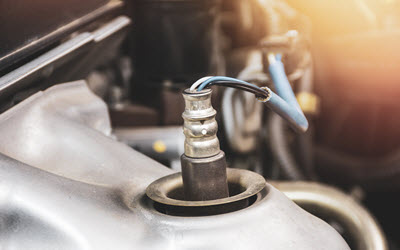
The Best Repair Shop in Santa Barbara to Replace the Oxygen Sensor of Your Audi
24 Jul, 21
As an Audi owner, you are likely committed to sustainability, and your Audi’s oxygen sensors play an important role in that commitment. More specifically, your vehicle’s oxygen sensors measure the levels of oxygen in your Audi’s exhaust and adjust the system accordingly, thus reducing your vehicle’s carbon monoxide emissions. Not only does this decrease pollution, but it also helps your Audi run more efficiently. As such, it’s vital that you keep your Audi’s oxygen sensors in good repair.
Common Causes of Oxygen Sensor Malfunction
The best way to maintain your Audi’s oxygen sensors is by preventing them from being damaged in the first place. Fortunately, many of the factors that lead to oxygen sensor malfunction are easily avoidable.
For example, one of the most common causes of oxygen sensor failure is the use of improper fuel. Low-quality or contaminated gasoline can interfere with an oxygen sensor’s ability to function properly, eventually causing it to break down entirely. Therefore, you should always fill your Audi’s gas tank with the recommended fuel.
Similarly, other types of contamination can also cause your Audi’s oxygen sensors to stop working. Lead contamination, for example, can lead to rust forming on the sensor, whereas coolant or silicone sealant contamination may cause parts of the sensor to turn white. All of these conditions can disrupt the sensor’s ability to accurately read oxygen levels and should thus be prevented through routine maintenance.
Finally, general wear and tear may also lead to oxygen sensor failure. In order to make accurate readings, your Audi’s oxygen sensors must be kick-started by extreme heat. Although the sensors are designed to handle this heat, they are not invincible, and will eventually begin to warp and melt. On average, most oxygen sensors tend to last for approximately 100,000 miles. As such, the best way to make sure your Audi’s oxygen sensors don’t malfunction is by regularly taking your vehicle to an automotive repair shop for routine maintenance.
Not only will following your Audi’s recommended maintenance schedule help prevent the vehicle’s oxygen sensors from experiencing corrosion or contamination, but it will also ensure that any damaged sensors are replaced before they can cause significant problems.
Signs of Sensor Failure
Typically, regular maintenance will be enough to keep your Audi’s oxygen sensors running smoothly and efficiently. However, accidents happen, and an oxygen sensor may someday fail without warning. As such, it is vital that you know how to identify and fix a malfunctioning oxygen sensor. To help you with this, here are some of the most common signs of failing oxygen sensors in Audis:
- Decreased fuel efficiency: As previously mentioned, your Audi’s oxygen sensors regulate fuel levels to maintain a proper fuel-to-oxygen ratio in your vehicle’s engine. As such, if the sensors malfunction, your Audi might begin using more fuel to go the same distances. This, in turn, can lead to reduced fuel economy.
- Rough idling: If your vehicle’s fuel mixture is either too rich (too much fuel) or too lean (too much oxygen), it will not be properly processed by the engine. Therefore, because malfunctioning oxygen sensors can easily cause a vehicle’s fuel mixture to be too rich or too lean, they often lead to rough idling.
- Engine misfires and stalling: If left unaddressed, rough idling may eventually give way to engine misfires and stalling. Again, these conditions occur when malfunctioning oxygen sensors disrupt the fuel-to-mixture ratio, making it difficult for the engine to consume fuel. Because these symptoms can be quite dangerous, and sometimes even lethal, they should be addressed as soon as you notice them.
- Check-engine light illumination: A final common symptom of oxygen sensor failure is illumination of the check-engine light. If you notice this symptom, especially in conjunction with any of the other symptoms discussed above, you should have a professional mechanic examine your Audi as soon as possible.
Santa Barbara Autowerks: Come Meet our Master Technicians
Because oxygen sensors  are essential to your Audi’s sustainable functioning, replacing them is a task best left to the experts. That’s where we come in. At Santa Barbara Autowerks, our master technicians have the expertise necessary to replace your Audi’s oxygen sensors safely and efficiently. We are Santa Barbara’s most trusted shop for German auto repair, so give us a call today or stop by to find out what we can do for you.
are essential to your Audi’s sustainable functioning, replacing them is a task best left to the experts. That’s where we come in. At Santa Barbara Autowerks, our master technicians have the expertise necessary to replace your Audi’s oxygen sensors safely and efficiently. We are Santa Barbara’s most trusted shop for German auto repair, so give us a call today or stop by to find out what we can do for you.




